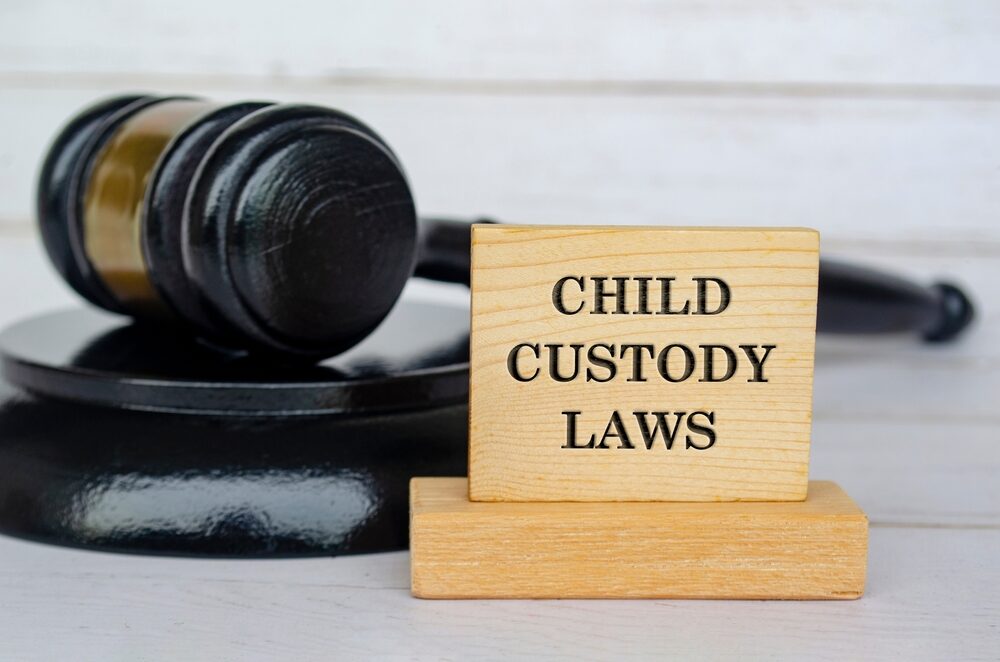One of the most emotional considerations in any divorce is the custody and care of the couple’s children.
In Virginia, as in most states, the court system bases custody decisions on the child’s best interests. However, your child’s best interests may mean different things to you and your spouse. If you are navigating a divorce in Virginia, how can you ensure your rights as a parent are being protected? What happens if you can’t agree on custody or you believe your spouse should not have custody of your children?
A child custody dispute requires a clear understanding of state laws, parental rights, and legal processes. At Melone Hatley, P.C., our experienced Newport News, Virginia child custody attorneys are here to help you understand Virginia child custody law and advocate for you if you and your spouse cannot agree on custody and must rely on the court to make custody decisions.
What is the Legal Definition of Custody in Virginia?
In Virginia, Virginia Code §20-124 sets out the legal definition of custody. The law recognizes two primary types of custody: physical custody and legal custody. These are then further broken down into how they will be shared by the parents, with awards of either joint or sole custody.
Physical Custody
Physical custody refers to where the child will reside and which parent will be responsible for their day-to-day care.
Virginia courts typically award some form of joint physical custody, with a primary custodial parent and the noncustodial parent having visitation rights.
Legal Custody
Legal custody refers to the authority to make important decisions regarding the child’s upbringing, such as their education, healthcare, religion, and general welfare.
Virginia courts typically award joint legal custody, which allows both parents to make these decisions.
Sole Custody
Sole custody is when one parent is awarded the physical care and control of the child and the authority to make decisions for them. However, it is important to note that awards of sole custody are rare.
Schedule your free meeting with our team today to see if our Child Custody Lawyers can help you.
How Courts Generally Award Custody in Virginia
When making custody decisions, Virginia courts believe it is in the child’s best interests for both parents to have an active role in their lives. Consequently, some form of joint custody is typically awarded.
However, the court can award sole custody in cases where it believes joint custody is not in the child’s best interests.
Common reasons the court may consider sole custody include
- A history of physical, emotional, or sexual abuse toward the child or other parent
- A history of neglect, such as a failure to provide food, clothing, shelter, education, or medical care
- A history of substance abuse that is a threat to the child’s safety and stability
- A history of serious mental health issues that could impair their ability to care for the child
- Lack of a stable living environment
- Parental alienation, or one parent’s attempt to damage the child’s relationship with the other parent
- An inability or unwillingness to co-parent
- One parent’s absence of lack of involvement
- A history of violent or dangerous criminal behavior
In Virginia, the court may consider a child’s preference in custody decisions if they are of sufficient age and maturity. However, the child’s preference will not be the primary determinant of custody decisions made by the court.
Newport News Child Custody Lawyer Near Me (757) 690-7779
What Does “Best Interests of the Child” Mean in a Virginia Custody Case?
The guiding principle in most custody cases in the United States is the “best interests of the child” standard. This means the court will focus on the child’s needs, not necessarily the parents’.
In custody disputes, the court will conduct a thorough evaluation to determine what arrangement will be most beneficial to the child. It will consider factors such as
- The age, physical condition and mental condition of the child, determining what custodial arrangement will provide the best support for the child under those circumstances
- The age, physical condition, and mental condition of the parents, determining each parent’s capacity to care for the child’s needs
- The child’s emotional, intellectual, and physical needs and how well each parent currently meets them
- Who the child’s current caregiver is and the length of time the child has lived with them
- The safety, security, and stability of each parent’s home
- The current relationship between the child and each parent, including their emotional bond and their level of involvement in the child’s life
- The child’s level of attachment to other relationships, including family members
- The willingness of each parent to support the child’s relationship with the other parent
- Possible negative effects on the child’s development if they are removed from their current residence
- Any history of domestic or sexual abuse in the family
While the best interests of the child principle is the gold standard in child custody cases, the court has a high level of discretion in determining exactly what that is. Consequently, it can be critical to have the skilled legal representation of a Virginia child custody lawyer to frame your situation in the most advantageous light possible for the court’s review.
Click to contact our Newport News Family Lawyers today
What Happens if You Believe Your Spouse Should Not Have Custody of Your Child?
Virginia courts generally favor custody arrangements where both parents remain actively involved in their child’s life. However, there are situations when joint custody may not be in the child’s best interests.
If one parent is seeking sole custody, that parent must provide clear evidence to the court that custody by the other parent would be detrimental to their child’s welfare. This evidence could include police reports and protective orders, witness testimony by family, friends, or neighbors, medical or psychological records showing substance abuse or mental health issues, or school or childcare facility reports reflecting concerning behavior, attendance issues, or statements from providers who have observed signs of neglect or abuse.
Schedule a call with one of our client services coordinators today
What is the Role of a Guardian Ad Litem (GAL)?
When there are serious allegations by one parent, the court may appoint a guardian ad litem (GAL). A guardian ad litem is a court-appointed attorney who represents the child’s best interests in contentious custody matters. A GAL will investigate the case, interview both the parents and child, and provide a recommendation to the court.
While the court is not obligated to follow the GAL’s recommendations, they are usually heavily considered in the custody determination. Ultimately, the court will carefully consider all evidence presented, ensuring that any decision to deny custody aligns with protecting and supporting the child.
Custody Evaluation
If one parent has made allegations against the other without clear evidence, the court may order a third-party custody evaluation, typically performed by a licensed psychologist or social worker, to shed additional light on a custody dispute.
An evaluation offers a comprehensive and objective assessment of each parent’s strengths and weaknesses in complex or high-conflict custody cases. The evaluator will submit a report to the court with their findings and recommendations or testify before the court.
While an evaluator’s recommendations can be influential, the court still retains full discretion in making the final custody determination.
Requesting Supervised Visitation
The court rarely denies custody to a parent. Even when sole custody is awarded, the noncustodial parent typically has the right to visitation. In this case, the primary custodial parent can seek supervised visitation for the other parent. This allows the child to spend time with the noncustodial parent under the supervision of a third party.
Can Parents Create Their Own Custody Agreement?
A mutually agreed-upon custody plan can reduce conflict, promote cooperation, and give parents more control over their arrangements. Consequently, courts in Virginia encourage parents to create their own custody arrangements.
To negotiate and create a fair and effective custody arrangement, parents can work with their attorneys or a mediator to draft an agreement that prioritizes their child’s welfare while addressing both parties’ schedules and needs.
A comprehensive custody agreement should include
- A detailed physical custody schedule specifying where the child will reside and when, including regular weekly arrangements as well as holidays, vacations, birthdays, and other special occasions
- A detailed definition of how decisions will be made about the child’s education, healthcare, religious upbringing, or other matters of their general welfare
- A visitation schedule for the noncustodial parent
- Guidelines on how parents will communicate regarding the child’s needs and schedule changes, including how they will handle emergencies
- Details on who will be responsible for transporting the child between households
- Any limitations on each parent’s relocation
- A plan for resolving disputes between parents
- Special provisions or rules concerning the child’s upbringing
Once both parents have agreed to the terms of the custody agreement, it must be submitted to the court for approval. If the agreement appears fair and comprehensive and considers the child’s best interests, the court will approve it and it will become legally binding.
What are the Benefits of Negotiating a Mutually Agreed-Upon Child Custody Agreement?
There are several benefits to negotiating a mutually agreeable custody agreement:
- It reduces court involvement and prevents a lengthy and costly court battle.
- Collaboration fosters cooperation and communication which will serve co-parents well as they navigate joint custody.
- Parents can tailor their plan to fit their and their child’s life, routines, and schedules.
- Parents can maintain more control over the decision-making process instead of relying on the court.
While parents are not required to have legal representation when drafting a custody agreement, it will be beneficial to have the guidance of a Virginia child custody lawyer to ensure that the agreement clearly defines terms, addresses potential issues that might arise, and aligns with Virginia law.
The experienced Newport News, Virginia child custody attorneys at Melone Hatley, P.C. are here to protect your parental rights. Whether you are attempting to negotiate a mutually agreeable child custody agreement with your spouse or have hit a roadblock, we will be your legal ally throughout the process.
What if You Want to Change Your Custody Orders?
After divorce, a change in circumstances may justify a change to custody orders, such as a move, a change in the child’s needs, or a parent’s inability to maintain custody. For a modification to be legally enforceable, parents can jointly agree to a new agreement and submit it to the court for approval.
However, if one parent requests a modification, the court will require evidence of a significant change in that parent’s circumstances and that the modification is in the child’s best interests.
Significant changes in circumstances that could warrant the court’s modification of custody orders can include
- Relocation of a parent if it affects the child’s living arrangements, schedule, or well-being
- A change in a parent’s employment or health that could impact their ability or availability to parent
- The child’s changing needs
If the court agrees to a modification, it will issue a formal, updated custody order outlining the modified terms. This becomes a legally binding court order that both parents must follow. It is important to note, however, that modifying custody orders may affect child support obligations, and the court may need to review the child support order as well.
How are Custodial Orders Enforced?
Virginia courts aim to ensure that both parents respect custody orders. If one parent has violated the order, such as refusing to return the child, failing to comply with the agreed-upon schedule, or withholding visitation, the other parent can seek enforcement through the court.
Legal options include
- Filing a motion for contempt – This requires a court hearing where both parents will present their sides. The court may impose various sanctions if a parent is found in contempt.
- Modifying custody orders – A modification can change visitation to reduce further conflicts or grant sole custody.
- Petitioning for make-up parenting time – This will compensate one parent for missed visitation time.
- Calling for the intervention of law enforcement – While Virginia law allows law enforcement to intervene when there is a clear and enforceable court order or if one parent unlawfully keeps or abducts a child, parents are usually advised to seek court enforcement first in a custody dispute.
- Enforcing custody orders across state lines – Virginia recognizes the Uniform Child Custody Jurisdiction and Enforcement Act, which allows the enforcement of custody orders across state lines.
When violations of a custody order pose a risk to a child’s safety, the other parent may petition the court to impose supervised visitation, allowing the violating parent to spend time with the child only while in the presence of a third party.
What are the Custodial Rights of Unmarried Parents in Virginia?
In Virginia, unmarried parents have the same custodial rights as married parents. However, establishing paternity is usually necessary, as it legally recognizes the father’s relationship to the child and establishes his rights and responsibilities. This can be done through
- A signed Voluntary Acknowledgment of Paternity at the time of birth or through the Virginia Department of Health’s Division of Vital Records
- Genetic testing ordered by the court or through the Virginia Department of Social Services
- A paternity petition with the Juvenile and Domestic Relations District Court
Once paternity is established, it gives the father legal standing as the child’s parent, with the right to seek custody and visitation, and the responsibility to provide financial support for the child.
The Importance of Legal Guidance
When making custody decisions, Virginia courts prioritize the well-being of the child, while striving to balance parental rights and responsibilities. However, in a contentious divorce, both parents can be at odds with what they consider is in their child’s best interests. Having the right legal support can be critical during a child custody dispute.
At Melone Hatley, P.C., our experienced Newport News, Virginia child custody attorneys will work diligently to support your and your family’s best interests and secure the best custody outcome possible. Contact us today at (757) 690-7779 to discuss your case, or schedule a free consultation through our website contact form.
Schedule a call with one of our client services coordinators today.






























